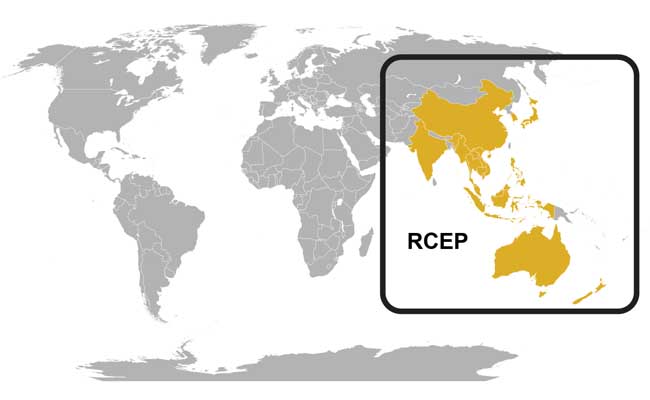
The future of RCEP depends heavily on how India and China negotiate and accommodate each other’s interests and, of course, how other participants react to it
Manish K. Pandey | The Dollar Business
Yet another round of talks on the Regional Comprehensive Economic Partnership (RCEP), held recently in New Delhi, ended without a conclusion. Members of RCEP – 10 economies of the ASEAN region and six of its free trade partners: Australia, China, India, Japan, Korea and New Zealand – once again could not agree on modalities (based on which the negotiations would move) of this ambitious RTA, which has already been beaten thin through five rounds of discussions previously. This was bound to happen. What else would you have expected from an accord which, once implemented, is slated to be the largest free trade bloc in the world (accounting for nearly 50% of the world’s population, over 30% of the world’s GDP and a similar share in global trade)? And the one which involves 16 economies, all at different stages of development and having varied requirements?
Since the negotiations began in May 2013 in Cambodia, RCEP has been touted as an unconventional and reformist move by ASEAN and other member countries. No doubt, if implemented, it has the potential to create a new paradigm for economic integration across Asia-Pacific region by creating a mega free trade zone. But how? That’s still a question, as reflected in recent discussions in New Delhi. Although all members seem desperate to reach an agreement, they are still not willing to bow down to others’ demands that don’t serve their interests. And why should they, anyway? For, they have their reasons. While some of them are manufacturing powerhouses, others have shown prowess in services. Doesn’t everyone desire to take back home something that benefits their economy?
As far as India is concerned, she is on a tricky terrain. While on one hand joining RCEP is crucial for India as it’s not part of the other two ongoing mega regional trade negotiations – Transatlantic Trade and Investment Partnership (TTIP) and The Trans-Pacific Partnership (TPP; both of which are led by US], joining it would mean Chinese rivals posing a big threat to Indian manufacturers. India, till now, has shied from a free trade pact with the influential neighbour, but with RCEP coming into force (if!), India-China relations are bound to see new-fangled subtleties and flux with geopolitical games in the region taking surprising turns. Hence, New Delhi needs to carefully examine the efficacy and implications of RCEP and negotiate the pact accordingly so that it safeguards its interests. That’s what exactly India is doing right now. “Some specific sectors based on our core competencies have been suggested in the strategic plan of the initiative. Therefore the stress has been on attracting investments in these sectors by facilitating the working environment for business and undertaking the necessary reforms,” Minister of State for Commerce and Industry Independent Charge Nirmala Sitharaman stressed in her speech at the inauguration of the 6th RCEP meeting on December 1, 2014. China, on the other hand, has a different agenda. The dragon wants to challenge the US-led TPP that excludes it. That can happen if the country is able to establish its supremacy over others in the region, which is a difficult task considering that there are heavyweights like Japan, India and Australia involved.
The future of RCEP depends heavily on how India and China negotiate and accommodate each other’s interests and, of course, how other participants react to it. Moreover, if member countries really want to forge a mega alliance, they will have to stop looking at RCEP as yet another typical market access initiative and view it as a strategic cooperation that would lead to the overall development of the Asia-Pacific region.
Participants will have to certainly find an approach that is acceptable to all, and real soon. There is no “one size fit all” solution, but there’s definitely one that works for the majority!
Let’s see what shapes up when the next round begins in Thailand on February 9. We wish the RCEP round-table diplomats a wonderful 2015!
Get the latest resources, news and more...
By clicking "sign up" you agree to receive emails from The Dollar Business and accept our web terms of use and privacy and cookie policy.
Copyright @2026 The Dollar Business. All rights reserved.
Your Cookie Controls: This site uses cookies to improve user experience, and may offer tailored advertising and enable social media sharing. Wherever needed by applicable law, we will obtain your consent before we place any cookies on your device that are not strictly necessary for the functioning of our website. By clicking "Accept All Cookies", you agree to our use of cookies and acknowledge that you have read this website's updated Terms & Conditions, Disclaimer, Privacy and other policies, and agree to all of them.

